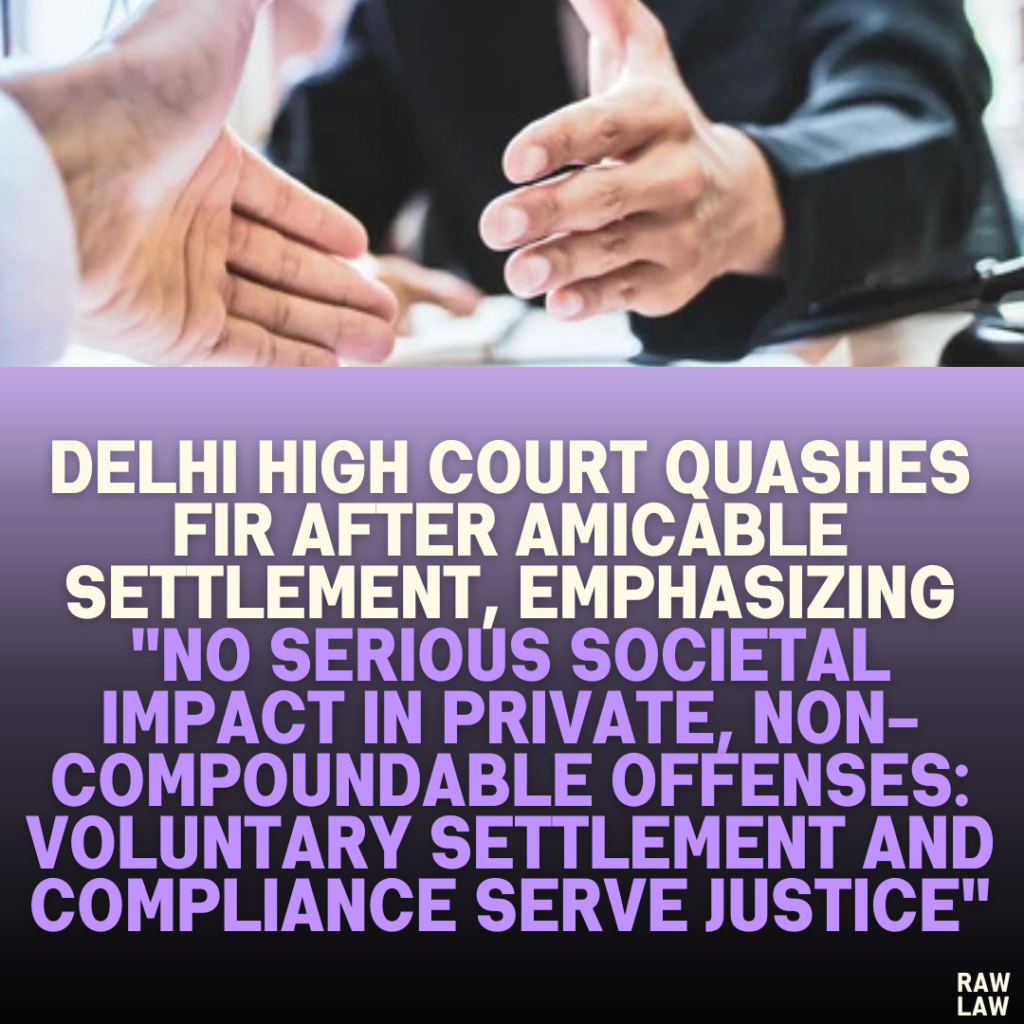Court’s Decision:
The Delhi High Court, invoking its powers under Section 528 of the Bharatiya Nagarik Suraksha Sanhita, 2023 (BNSS), allowed the petition to quash FIR No. 48/2020, which pertained to an accident causing the death of the complainant’s spouse. The Court found the case to involve non-compoundable offenses of a private nature that do not seriously impact society. Given the settlement between the parties, the Court concluded it appropriate to quash the criminal proceedings.
Facts:
The petitioner was implicated in an FIR registered on February 5, 2020, following an accident that occurred near Sainik Farms, Delhi. The accident led to injuries and, subsequently, the death of the respondent’s spouse. Charges were filed under Sections 279, 337, and 304A of the Indian Penal Code (IPC) and Sections 146 and 196 of the Motor Vehicles Act (MV Act). The petitioner and the complainant reached a settlement in which the petitioner agreed to pay Rs. 4,00,000 as compensation to the complainant, which was duly paid.
Issues:
The main issue was whether the High Court should exercise its power under Section 528 of the BNSS to quash the FIR and criminal proceedings based on a private settlement, especially in the context of non-compoundable offenses.
Petitioner’s Arguments:
The petitioner argued that the settlement resolved all disputes with the complainant, who had submitted a supporting affidavit expressing no objection to the quashing of the proceedings. Given the private nature of the dispute and lack of societal impact, the petitioner sought quashing of the FIR and related proceedings.
Respondent’s Arguments:
The respondent, through counsel, supported the petition, confirming that the settlement was reached voluntarily and without coercion. The respondent’s affidavit also indicated no objection to quashing the FIR.
Analysis of the Law:
The Court examined Section 528 of the BNSS, allowing for quashing of criminal proceedings involving non-compoundable offenses of a private nature. The Court cited the principle established in State of Madhya Pradesh v. Laxmi Narayan and Ramgopal v. State of Madhya Pradesh, recognizing that courts may exercise this power where the offense has no serious societal impact and the compromise is voluntary and amicable.
Precedent Analysis:
The Court referred to the Supreme Court’s decisions in Laxmi Narayan and Ramgopal, which allow for quashing non-compoundable offenses when they stem from personal disputes with no adverse societal impact. The Court emphasized that these rulings empower High Courts to ensure fairness and justice by acknowledging voluntary settlements in private disputes.
Court’s Reasoning:
The Court noted that the petitioner complied with the settlement terms, transferring Rs. 4,00,000 to the complainant. Given the absence of allegations of coercion and the voluntary nature of the settlement, the Court was satisfied that quashing the FIR would not negatively affect society and would serve justice by respecting the complainant’s consent and the petitioner’s compliance.
Conclusion:
The High Court granted the petition and quashed FIR No. 48/2020, including all related proceedings, in view of the settlement and legal precedents.
Implications:
This judgment underscores the High Court’s discretion under BNSS Section 528 to quash criminal proceedings in non-compoundable offenses where disputes are personal, have no broad societal impact, and are resolved amicably. The decision reinforces the relevance of voluntary settlements in private disputes and the legal acknowledgment of compromises that do not harm societal conscience.
